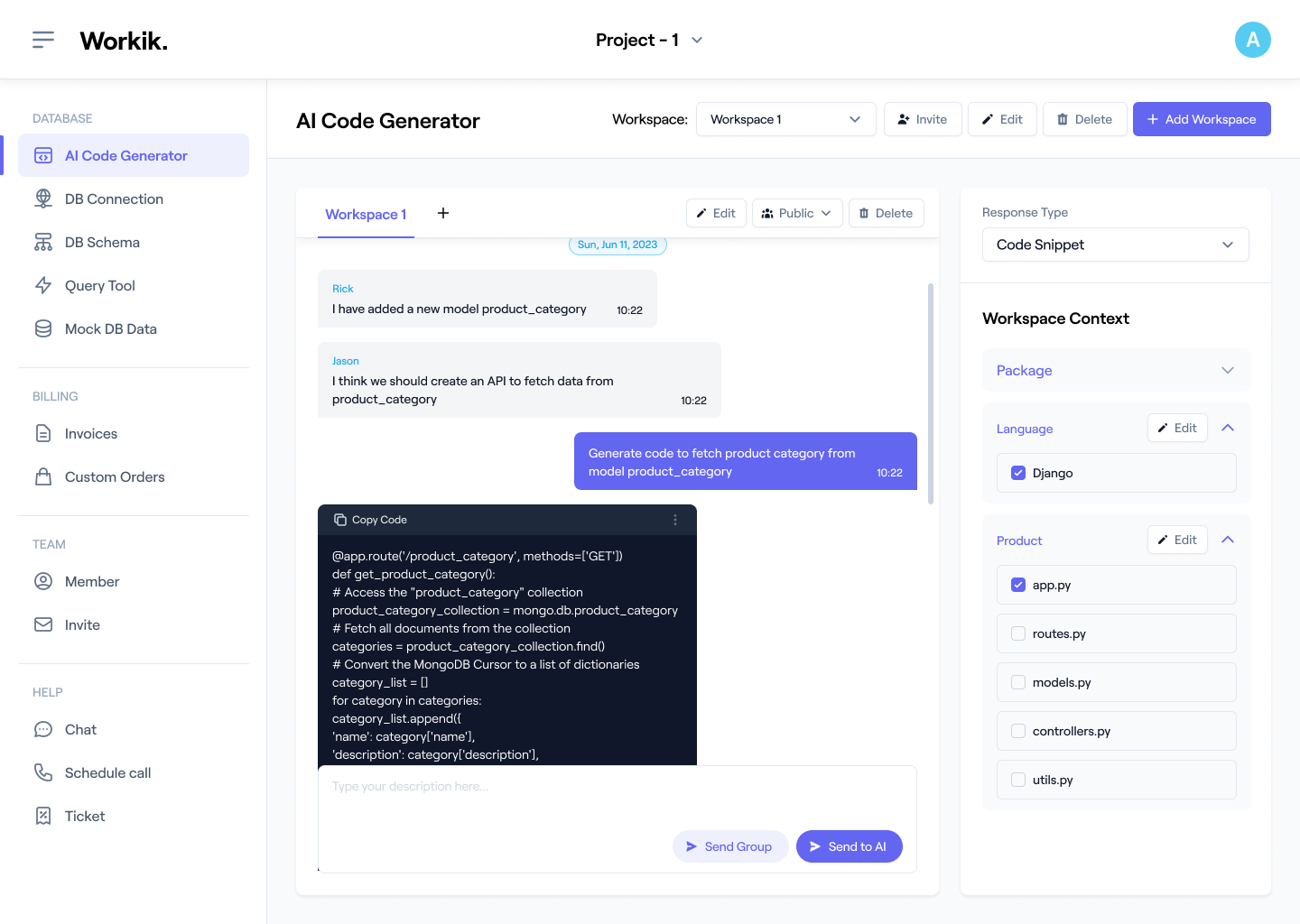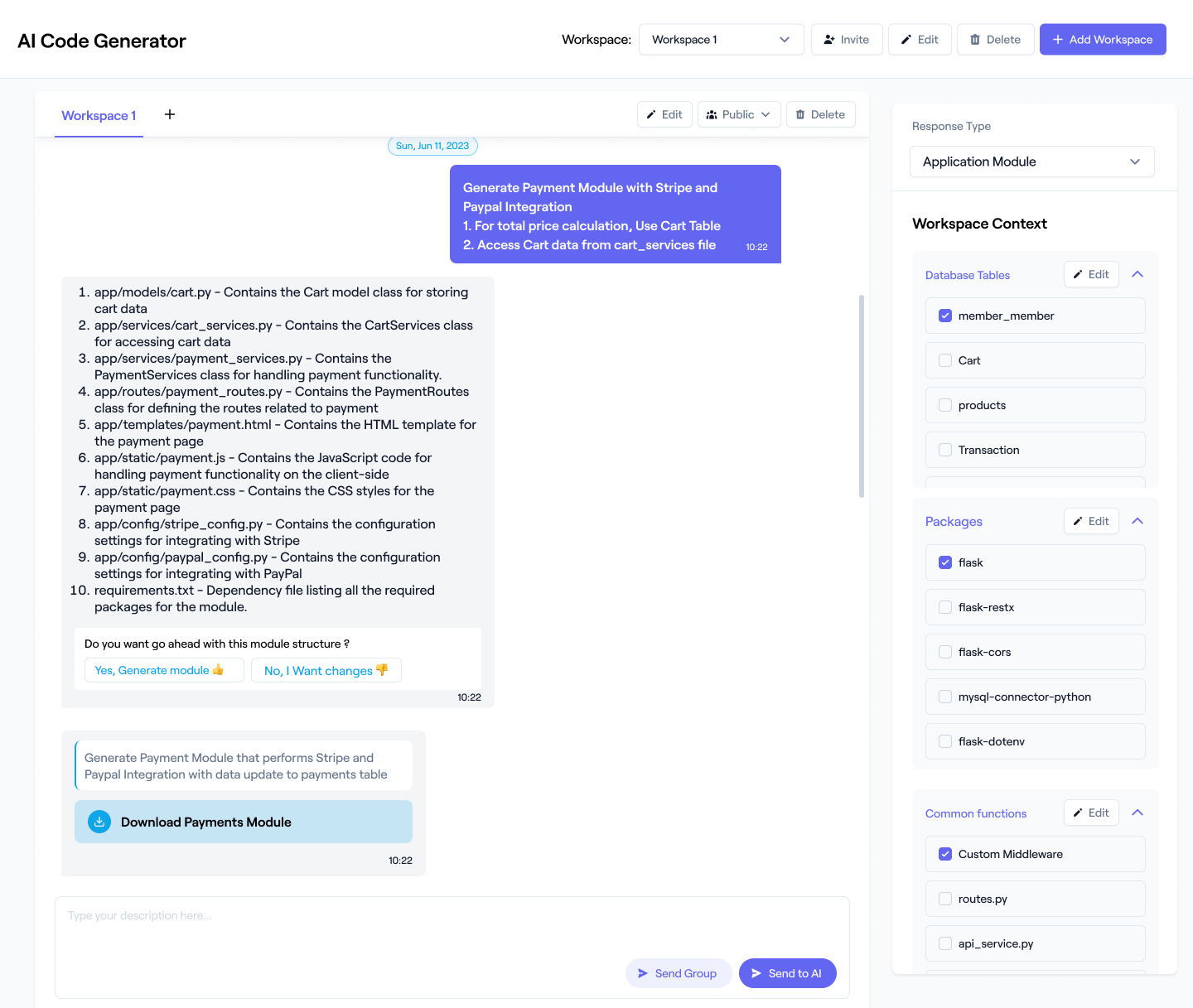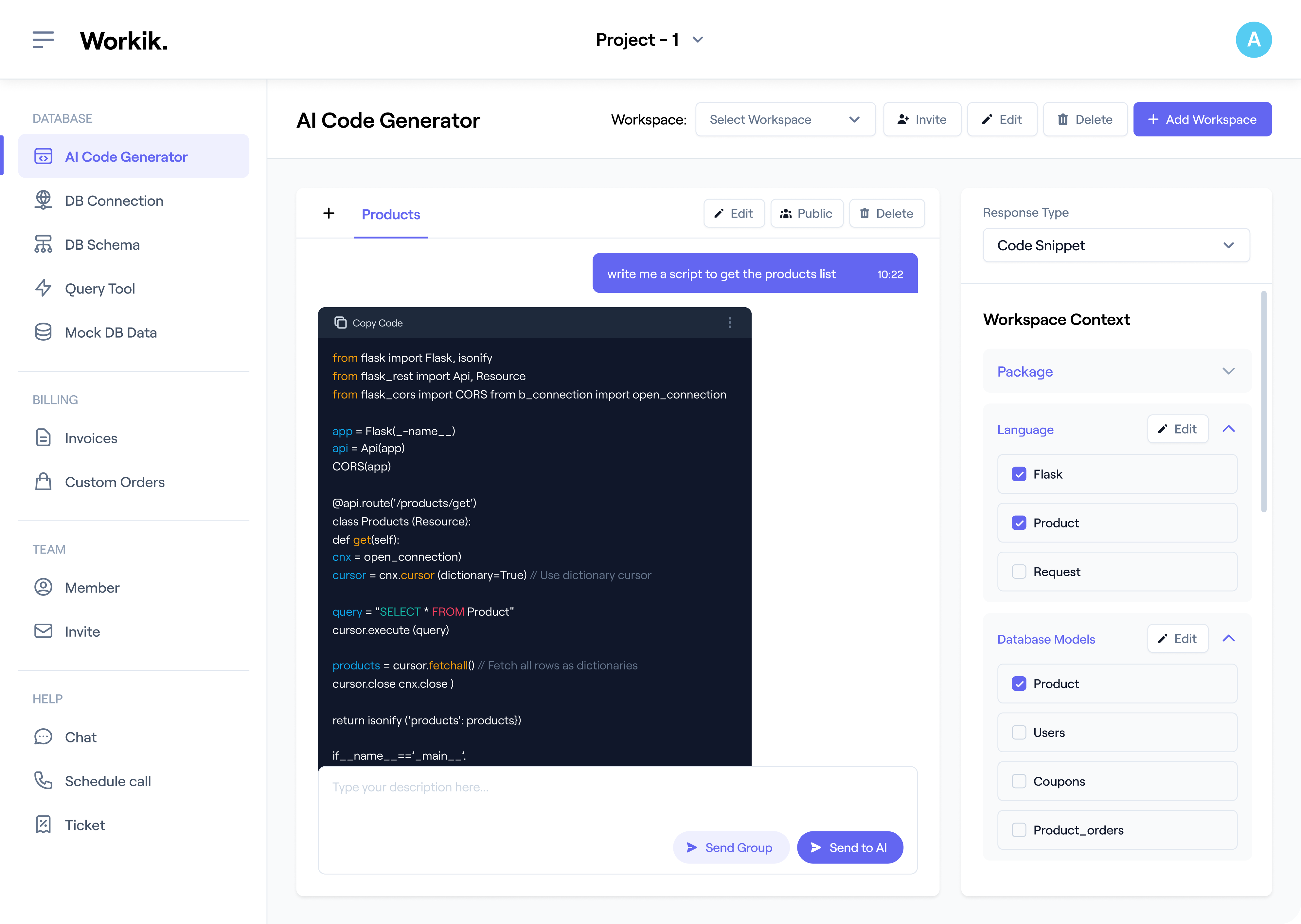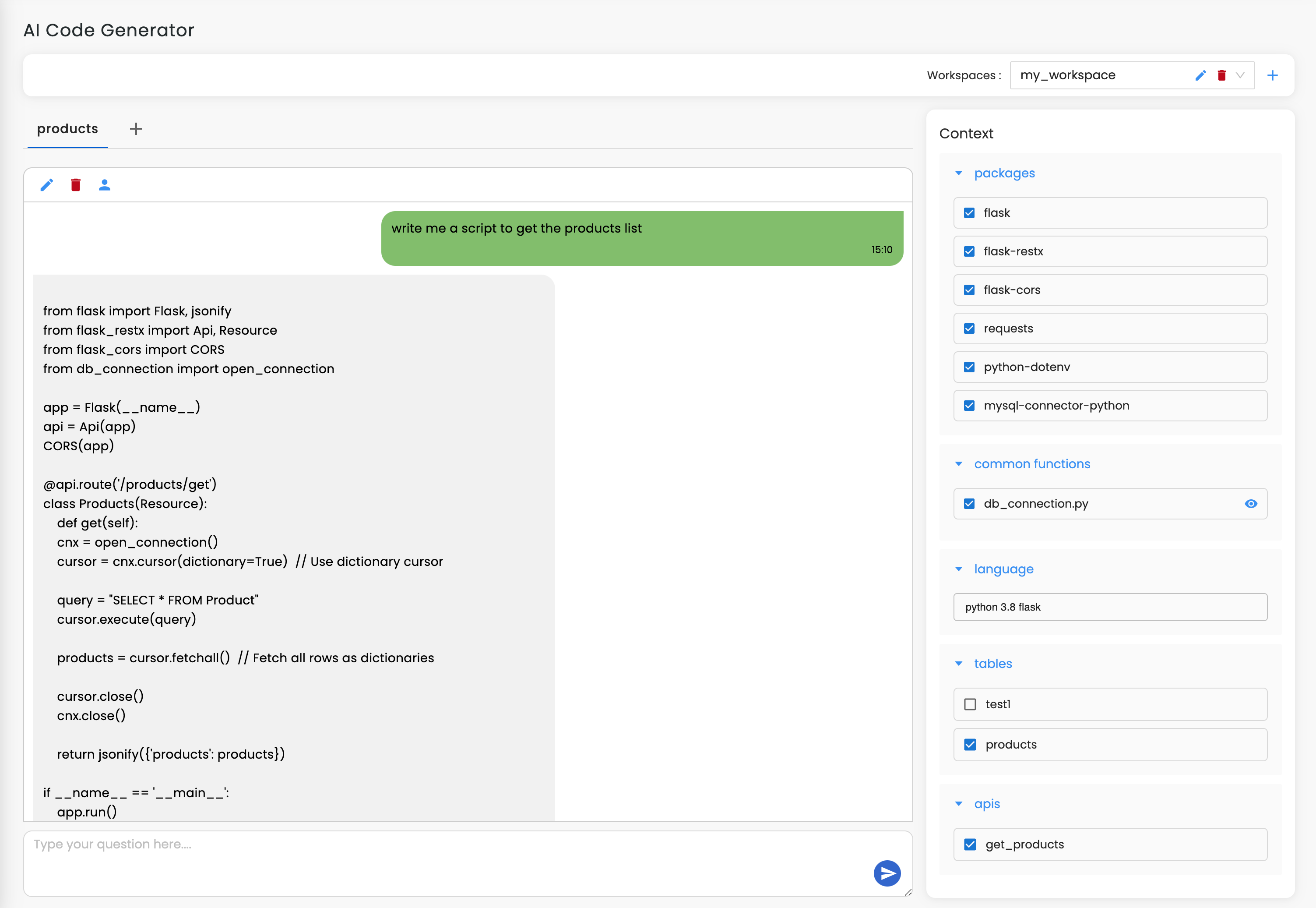
Join our community to see how developers are using Workik AI everyday.
Features

Instant Schema Creation
AI can generate scalable GraphQL schemas from your database (Prisma, Hasura), tailored to your specific design.

Create Optimized Queries
AI helps build CRUD queries and mutations, reducing manual errors. Integrates smoothly with Apollo Server or Nexus.

Map Databases to APIs
AI maps PostgreSQL or MySQL schemas to GraphQL APIs while ensuring best practices for schema relationships.

Boost Query Performance
AI effectively analyzes query performance to reduce over-fetching and speed up API responses in Apollo Client or Urql.
How it works
Sign up quickly using Google or manually enter your details to access Workik’s AI-powered GraphQL API development tools.
Link your GitHub, GitLab, or Bitbucket repositories. Specify relevant libraries like Apollo Server, Prisma, or Relay, and include your database schema for tailored AI assistance.
Generate efficient GraphQL schemas, queries, and mutations with AI-driven suggestions. Whether building a GraphQL API from scratch or integrating with existing systems, AI accelerates your development process.
Invite your team to collaborate on GraphQL projects within Workik. Share workspaces, assign tasks, and leverage AI insights to enhance API performance and code quality.


Expand


Expand


Expand


Expand


Expand


Expand


Expand


TESTIMONIALS
Real Stories, Real Results with Workik
Workik’s AI automated my GraphQL schema and boosted development speed significantly. It's a game-changer for backend engineering!

Alexander Smith
Senior Backend Engineer
Building GraphQL APIs is effortless with Workik. The AI mapped my database to GraphQL instantly, saving hours of manual work!

Emily Rodriguez
Full-Stack Developer
Query optimization has been a revelation! My GraphQL APIs run faster, and Apollo integration was seamless with Workik.

Michael Lee
Frontend Developer
What are the popular use cases of Workik's AI for GraphQL API generation?


Workik’s AI-powered GraphQL API generation is ideal for a variety of use cases which include but are not limited to:
* Create GraphQL schemas from relational or NoSQL databases.
* Build CRUD queries and mutations for rapid API development.
* Integrate with Apollo Server or Nexus for efficient backend setup.
* Optimize database queries with AI-driven insights to boost API performance.
* Implement secure authentication and authorization for GraphQL APIs.
* Automate API documentation and version control to streamline API management.
* Set up testing environments for GraphQL queries, mutations, and resolvers.
What kind of context can I add in Workik AI related to my GraphQL API project?


Setting context in Workik is optional but enhances AI-generated GraphQL code. Here are the types of context you can add:
* Existing code files and functions (sync your GraphQL project from GitHub, GitLab, or Bitbucket)
* Programming languages (e.g., JavaScript, TypeScript)
* Frameworks (e.g., Apollo Server, Prisma, Relay)
* Database schemas (e.g., PostgreSQL, MySQL with Prisma or Hasura)
* API blueprints (e.g., Postman or Swagger for GraphQL API endpoint testing)
Can Workik help with handling large, deeply nested GraphQL queries?


Yes, Workik’s AI simplifies by breaking them down and optimizing how data is fetched. This ensures efficient resolution of large, complex queries, which often slow down APIs.
How does Workik AI assist front-end developers?


Workik AI generates optimized GraphQL queries, reducing over-fetching and ensuring seamless integration with tools like Apollo Client and Urql.
How does Workik AI handle versioning for GraphQL APIs?


Workik AI automatically manages schema changes without breaking existing queries, ensuring backward compatibility.
How does Workik AI assist with pagination in GraphQL APIs?


Workik’s AI can implement efficient pagination strategies such as cursor-based or offset-based pagination, helping you manage large data sets and improve query performance.
Can Workik AI help automate GraphQL schema stitching?


Yes, Workik’s AI allows you to combine multiple GraphQL schemas into a single API endpoint, simplifying microservices management.
How does Workik AI handle API documentation for GraphQL?


Workik AI generates documentation in sync with schema changes, including detailed descriptions of queries, mutations, and types.
Generate Code For Free

GraphQL API: Question and Answer
A GraphQL API is an API that allows clients to query and manipulate data using the GraphQL query language. It enables precise data fetching, where clients request exactly what they need, making the API more efficient. Unlike traditional REST APIs, GraphQL APIs provide a single endpoint for all requests, support complex queries, and reduce over-fetching and under-fetching of data.
Popular frameworks and libraries used in GraphQL API development include:
Server Setup:
Apollo Server, Express-GraphQL, GraphQL Yoga
Database Management:
Prisma, Hasura, PostGraphile
Client-Side Integration:
Apollo Client, Relay, Urql
Schema Creation:
TypeGraphQL, Nexus
Caching:
Apollo Client Cache, Relay Store
Testing & Debugging:
GraphQL Playground, GraphiQL, Jest
Subscriptions & Real-Time:
GraphQL Subscriptions, Apollo Federation
Popular use cases of GraphQL include:
Web Application Development:
Fetch precise data from multiple services with a single query, reducing API overhead.
Real-Time Data Updates:
Implement real-time features with GraphQL subscriptions, ideal for live data such as chats or stock updates.
Microservices Architecture:
Aggregate data from multiple services into a unified GraphQL API for easier client-side data management.
Mobile Application Development:
Minimize network calls and battery usage by fetching only required data for mobile apps.
Headless CMS:
Build flexible, API-first CMS solutions where content and data can be queried dynamically from multiple sources.
E-commerce:
Optimize product listings, user data, and inventory management with efficient data querying in online stores.
Data Analytics:
Use GraphQL for querying large datasets from analytics platforms, ensuring minimal data transfer with precise requests.
Career opportunities and technical roles for GraphQL API developers include API Developer, Backend Developer, Full Stack Developer, Mobile Developer, and Enterprise Application Developer. GraphQL API developers can also pursue roles such as Microservices Engineer, Data Engineer, and DevOps Engineer (GraphQL-focused).
Workik AI offers comprehensive GraphQL API assistance, including:
Schema Generation:
Automatically generate GraphQL schemas from database structures, reducing manual schema writing.
Query and Mutation Creation:
Build efficient CRUD queries and mutations, ensuring optimal performance and minimizing errors.
Database Integration:
Seamlessly map PostgreSQL, MySQL, or other databases to your GraphQL API for fast, efficient querying.
Testing:
Automate the creation of test cases for queries, mutations, and resolvers to ensure reliable API functionality.
Optimization:
Analyze and optimize complex GraphQL queries, reducing over-fetching and under-fetching to improve performance.
Authentication:
Implement secure authentication systems such as OAuth or JWT for API protection and role-based access.
Schema Stitching:
Automatically combine multiple GraphQL schemas into a single API, streamlining microservices integration.
Documentation:
Generate and maintain up-to-date API documentation to ensure consistency with schema changes.
Explore more on Workik
Get in touch
Don't miss any updates of our product.
© Workik Inc. 2026 All rights reserved.

